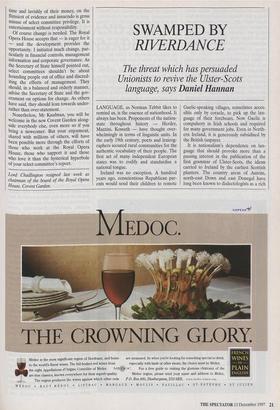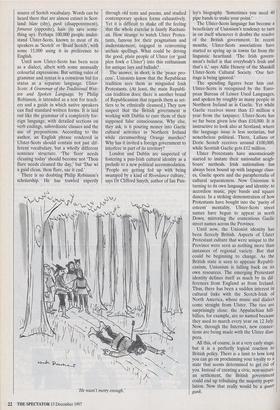SWAMPED BY RIVERDANCE
The threat which has persuaded Unionists to revive the Ulster-Scots
language, says Daniel Hannan LANGUAGE, as Norman Tebbit likes to remind us, is the essence of nationhood. It always has been. Proponents of the nation- state throughout history — Herder, Mazzini, Kossuth — have thought over- whelmingly in terms of linguistic units. In the early 19th century, poets and lexicog- raphers scoured rural communities for the authentic vocabulary of their people. The first act of many independent European states was to codify and standardise a national tongue.
Ireland was no exception. A hundred years ago, conscientious Republican par- ents would send their children to remote Gaelic-speaking villages, sometimes acces- sible only by coracle, to pick up the lan- guage of their forebears. Now Gaelic is compulsory in Irish schools and required for many government jobs. Even in North- ern Ireland, it is generously subsidised by the British taxpayer.
It is nationalism's dependence on lan- guage that should provoke more than a passing interest in the publication of the first grammar of Ulster-Scots, the idiom carried to Ireland by the earliest Scottish planters. The country areas of Antrim, north-east Down and east Donegal have long been known to dialectologists as a rich source of Scotch vocabulary. Words can be heard there that are almost extinct in Scot- land: blate (shy), gunk (disappointment), fornenst (opposite), haM (to save some- thing up). Perhaps 100,000 people under- stand Ulster-Scots, known to most of its speakers as 'Scotch' or 'Braid Scotch', with some 15,000 using it in preference to English.
Until now Ulster-Scots has been seen as a dialect, albeit with some unusually colourful expressions. But setting rules of grammar and syntax is a conscious bid for status as a separate language. Ulster- Scots: A Grammar of the Traditional Writ- ten and Spoken Language, by Philip Robinson, is intended as a text for teach- ers and a guide in which native speakers can find standard written forms. It is laid out like the grammar of a completely for- eign language, with detailed sections on verb endings, subordinate clauses and the use of prepositions. According to the author, an English phrase rendered in Ulster-Scots should contain not just dif- ferent vocabulary, but a wholly different sentence structure. 'The floor needs cleaning today' should become not `Thon flare needs cleaned the day,' but `Dae wi a guid clean, thon flare, sae it cud.'
There is no doubting Philip Robinson's scholarship. He has trawled expertly through old texts and poems, and studied contemporary spoken forms exhaustively. Yet it is difficult to shake off the feeling that the whole exercise is faintly Ruritani- an. How strange to watch Ulster Protes- tants, famous for their pragmatism and understatement, engaged in reinventing archaic spellings. What could be driving the good, plain people of Ulster (or `guid plen fowk o Ulster') into this enthusiasm for antique lays and ballads?
The answer, in short, is the 'peace pro- cess'. Unionists know that the Republican tradition sees them as misguided Irish Protestants. (At least, the main Republi- can tradition does; there is another brand of Republicanism that regards them as set- tlers to be ethnically cleansed.) They now suspect that the British government is working with Dublin to cure them of their supposed false consciousness. Why else, they ask, is it pouring money into Gaelic cultural activities in Northern Ireland while circumscribing Orange marches? Why has it invited a foreign government to interfere in part of its territory?
London and Dublin are suspected of fostering a pan-Irish cultural identity as a prelude to a new political accommodation. 'People are getting fed up with being swamped by a kind of Riverdance culture,' says Dr Clifford Smyth, author of Ian Pais- 'He wasn't merty enough.' ley's biography. 'Sometimes you need 40 pipe bands to make your point.'
The Ulster-Scots language has become a beneficiary of Unionism's tendency to turn in on itself whenever it doubts the resolve of the British government. In recent months, Ulster-Scots associations have started to spring up in towns far from the linguistic heartland. 'The Irish govern- ment's belief is that everybody's Irish and that's it,' says Alfie Henesy of the Shankill Ulster-Scots Cultural Society. 'Our her- itage is being ignored.'
The spending figures bear him out. Ulster-Scots is recognised by the Euro- pean Bureau of Lesser Used Languages, and spoken by roughly as many people in Northern Ireland as is Gaelic. Yet while Gaelic receives more than £3 million a year -from the taxpayer, Ulster-Scots has so far been given less than £10,000. It is instructive to look also at Scotland, where the language issue is less sectarian, but nonetheless political. There, Lallans or Doric Scotch receives around £100,000, while Scottish Gaelic gets £.12 million.
Ulster Protestants have unconsciously started to imitate their nationalist neigh- bours' methods. Irish nationalism has always been bound up with language class- es, Gaelic sports and the paraphernalia of cultural separateness. Now Unionism is turning to its own language and identity: to accordion music, pipe bands and square dances. In a striking demonstration of how Protestants have bought into the 'parity of esteem' mentality, Ulster-Scots street names have begun to appear in north Down, mirroring the contentious Gaelic street names across the Province.
Until now, the Unionist identity has been fiercely British. Aspects of Ulster Protestant culture that were unique to the Province were seen as nothing more than instances of regional variety. But that could be beginning to change. As the British state is seen to appease Republi- canism, Unionism is falling back on its own resources. The emerging Protestant identity defines itself as much by its dif- ferences from England as from Ireland. Thus, there has been a sudden interest in cultural links with the Scotch-Irish of North America, whose music and dialect come straight from Ulster. The ties are surprisingly close: the Appalachian hill- billies, for example, are so named because they used to march every year on 12 July. Now, through the Internet, new connec- tions are being made with the Ulster dias- pora.
All this, of course, is at a very early stage, • but it is a perfectly logical reaction to British policy. There is a limit to how long you can go on proclaiming your loyalty to a state that seems determined to get rid of you. Instead of creating a civic, non-sectari- an settlement, the British government could end up tribalising the majority popu- lation. Now that really would be a quaer gunk.



















































































 Previous page
Previous page